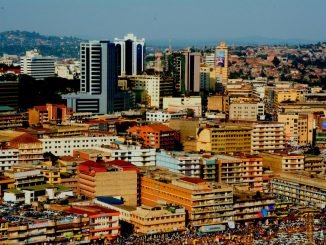
Kampala, Uganda | URN | The inadequate allocation of government funds for roads construction and maintenance in Kampala continues to be a significant topic in political and social discussions, highlighting the pressing issue of the city’s poor road infrastructure.
Recently, Kampala Capital City Authority (KCCA) faced public backlash over the city’s deteriorating road network. In an online exhibition titled “Kampala Pothole Exhibition,” social media users shared photos of roads riddled with potholes, aiming to draw attention to the urgent need for government intervention.
The matter was even raised in parliament and President Yoweri Museveni directed the Ministry of Finance to release six billion Shillings for road maintenance. During his State of the City address at City Hall Tuesday 30, May 2023, the City’s Lord Mayor, Erias Lukwago presented a comprehensive report on the condition of the city’s road network, revealing that the central government had allocated insufficient funds despite the dire state of the infrastructure in Kampala.

According to the KCCA report, out of a total of 2,110 kilometers of roads in Kampala, only 644 kilometers (31%) are paved. The report further indicates that only 213 kilometers of roads are in good condition, while 204 kilometers are classified as fair, 237 kilometers as poor, and a staggering 1,456 kilometers remain unpaved.
Lukwago expressed concern about the meager budget allocated to the Directorate of Engineering, which currently stands at 78.537 billion Shillings, with only 48.2 billion Shillings allocated for infrastructure development. Additionally, Lukwago noted that the funds received from the Uganda Road Fund, ranging from 24.8 billion Shillings to 27.4 billion Shillings, are also inadequate.

Lukwago highlighted the significant delay in disbursing the limited funds, leading to the accumulation of domestic arrears and the stalling of civil works. As of March 31, 2023, KCCA had received only 20 per cent of the expected 75 per cent of its development budget for road upgrades and reconstruction. From the Road Fund, the authority had received 59 per cent of the expected 75 per cent.
The report underscores that many roads in Kampala have exceeded their expected lifespan and require a comprehensive overhaul. Even after temporary repairs, potholes quickly reappear, particularly during the rainy seasons. In addition to addressing road infrastructure, Lukwago also acknowledged the mismanagement of floods in the city, which significantly impacts human settlements, infrastructure, health, and the overall socio-economic fabric.
Contributing factors to the flooding problem include rapid urbanization, environmental degradation, heavy silting due to poor construction practices, and improper garbage disposal, leading to clogged drainage channels. To mitigate the flooding issue, KCCA launched the Kampala City Drainage Master Plan in 2019. The plan aimed to construct nine primary channels, including Lubigi, Bukejje-Mayanja, Kinawataka, Nakivubo, Nalukolongo, Kansanga, Walufumbe, and other tertiary drains, at an estimated cost of US$ 210 million.

However, Lukwago lamented the lack of adequate funding hindering the implementation of these plans. To finance the plan, KCCA entered into contracts with China Railway No.10 Engineering Group Company Limited and Jiangxi Water and Hydropower Construction Company Limited to construct Lubigi and Nakamiro Channels, respectively.
Read Also: Road users in Kampala raise red flag over recurring potholes in the city
These projects were funded by a World Bank loan of 62 billion shillings and 20 billion shillings, respectively. While technical staff at KCCA report that the projects are over 80 per cent and 90 per cent complete, Lukwago remains skeptical, citing complaints related to compensation and unnecessary delays.
Lukwago also highlighted other issues, including insufficient funding for KCCA schools, the remuneration disparities at KCCA, the lack of a structural plan for the city, lack of the City Physical Plan among other issues. In her speech, the Speaker of the Council Zahara Luyirika was equally dismayed by the poor road network in the city and the continuous failure of the government to sufficiently fund the authority to carry out its mandate.
Luyirika reports that the deficit has reached worrying levels where service providers have suspended operations with KCCA due to delayed payments. This was the second State of the City address the first one having been held in 2022. It was introduced in the KCCA Amendment Act 2020 to allow the Lord Mayor, who is the City’s political head to report on the state of affairs of the city.



